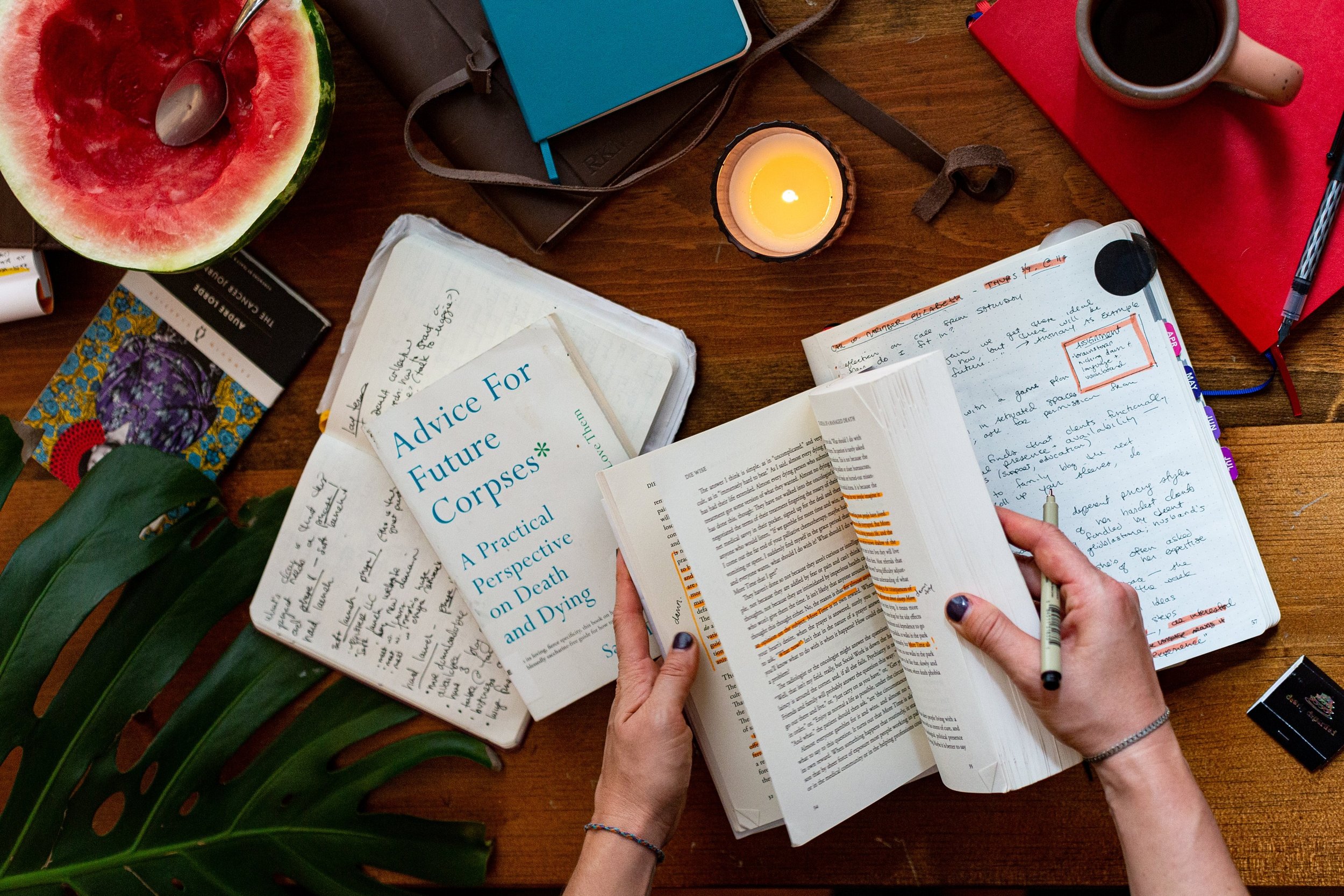
Death Work
In 2024, I co-founded The DC Death Collective with Laura Lyster-Mensh. As of early 2025, we are up and running.
Head on over to our landing pad to see what we’ve got going on these days.
A last note to visitors: below, I offer you a primer on death midwifery as my services get up and running ~ thank you for your patience!
What is a death midwife, anyways?
A death midwife — or a death doula, a death companion, there are many words for what we do — is a non-medical care provider that operates somewhere between centuries-old care traditions and the modern medical system. We are the bridge between these two worlds.
It might surprise you to hear that the ways we are dying in America — and what we are doing with our bodies — is all pretty new. For thousands of years, folks died close to home, surrounded + cared for by their community. This was often the domain of women: the healers, the midwives, the grannies, the aunties. The professionalization of death as we know it today is a recent phenomenon, reaching back only to about the Civil War. That conflict changed everything.
For the first time in our country’s short history, more folks were dying far away from home than ever before. There was an idea that embalming these bodies could make transport back easier — an idea that caught on like gangbusters after President Lincoln was assassinated and his body was taken on a last cross-country tour. Soon, a class of newly-minted, self-appointed professional embalmers created what would become a tightly controlled, male-dominated funeral industry. They were part of a new cultural movement that would inevitably change the way we die — and, in my opinion, not for the best.
The dovetail of both the funeral + medical industrial complexes have had a colossal effect on our collective cultural attitude toward death and dying. Dying is no longer seen as a bodily right of passage that we’re all headed towards, but a medical event to be solved for. But it’s not solvable. Death is not curable. My question is this:
How would we live differently if we had the language, tools, and support to navigate the spectrum of living and dying times? What does it mean to be afraid, and what would it take to quiet that storm? How could our lives be enriched — and emboldened — if we became active participants in considering death not as a failure, but as a return?
Who are death midwives for, and what do they do?
In short, death midwives serve everyone.
Service starts with a call, and can take on many forms. Midwives are nimble, adaptable, heart-centered folks who are ready to show up.
They work on an individual basis, and in a number of ways: they can help you do the admin of death, which might involve filling out advanced directives or calling funeral homes. They might provide grief support to you at a time that is both devastating and confusing. They can be the brains and bandwidth as an advocate who can help you wrangle with the medical system. The can amplify the wishes of your loved one. They can provide relief care so you can rest. They can cook meals, and help do your laundry. They fill the role of a loved + trusted family member — an extra set of hands and an extra heart.
The midwives also work for the community, and often wear many hats. We are educators are artists and activists. We throw death-literacy events, we create workshops. We use all kinds of expression to facilitate dialogue. We call in those who tip-toe towards us out of curiosity, and those who would rather never meet us. All are welcome.
Are death midwives a new thing?
Not at all — though this might be the first time you’re hearing about them in this way. They feel “new” in America, but are in fact very, very old, and exist in every culture around the globe. We’ve simply become disconnected from the work in recent times.
You can read about the legacy of the shrouding women here. I take a lot of inspiration from them
Why might I hire a death midwife?
In the case of a long-illness, many of us arrive with our loved ones at the end of their life only to realize that we’ve never done this before. There’s no roadmap, and no one has taught you how to do this. Death is simultaneously wildly base and earth-shakingly profound. A midwife can support you and your loved ones in this transition.
Of course, not all deaths come with a warning. In the cases of sudden loss, a midwife can still be there to help. you navigate the aftermath.
What sort of services will you offer?
My in-home services will be custom-tailored to each client. I’d love to speak with you about what you’re looking for.
I’ll be offering the creation of legacy projects for families: oral histories, archive development and management, and giving you the tools to embark upon your own documentary project.
Soon, I’ll be piloting living funeral parties. If that sounds exciting to you — whether you or someone you love in imminently on their way out, or you have no plans to be for a good long while — please do get in touch.
I want to advocate for a world where what I do is not a luxury afforded to the few who can afford private services. I offer a sliding scale for this reason. I envision a world where the paradigm has shifted, and what I have to offer is common, and once again belongs to the many.